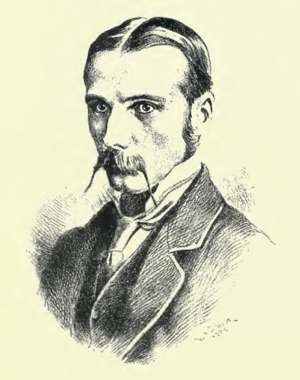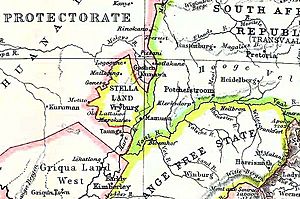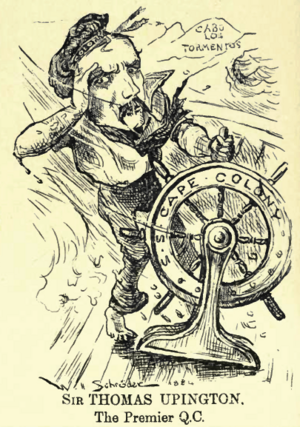Thomas Upington facts for kids
Quick facts for kids
Sir Thomas Upington
|
|
|---|---|

Thomas Upington, from a portrait in Het Volksblad, 1883.
|
|
| Prime Minister of the Cape Colony | |
| In office 13 May 1884 – 24 November 1886 |
|
| Monarch | Victoria |
| Governor | Sir Leicester Smyth Sir Henry D'Oyley Torrens Henry Augustus Smyth |
| Preceded by | Thomas Charles Scanlen |
| Succeeded by | John Gordon Sprigg |
| Attorney-General of Cape Colony | |
| In office Jan 1896 – May 1898 |
|
| Prime Minister | Gordon Sprigg |
| Preceded by | W P Schreiner |
| Succeeded by | Thomas Graham |
| In office May 1884 – Jul 1890 |
|
| Prime Minister | Gordon Sprigg |
| Preceded by | James Leonard |
| Succeeded by | James Rose Innes |
| In office Feb 1878 – Jan 1881 |
|
| Prime Minister | Gordon Sprigg |
| Preceded by | Andries Stockenström |
| Succeeded by | James Leonard |
| Personal details | |
| Born | 28 October 1844 Mallow, County Cork United Kingdom |
| Died | 10 December 1898 (aged 54) Wynberg, Cape Town, Cape Colony |
| Nationality | Anglo-Irish |
| Spouse | Mary Elizabeth Guerin |
| Children | 2 sons, 3 daughters |
| Alma mater | Trinity College, Dublin |
| Occupation | Politician, lawyer |
Sir Thomas Upington (1844–1898) was an important politician and leader in the British Cape Colony (now part of South Africa). He was born in Cork, Ireland.
He served as the Prime Minister of the Cape Colony for a short time, from 1884 to 1886. This was a very challenging period in the Cape's history. A town in the Northern Cape is named after him, called Upington.
Contents
Early Life and Education
Thomas Upington was born on October 28, 1844, near Mallow in County Cork, Ireland. He went to school at Cloyne Diocesan School and then to Trinity College, Dublin. At Trinity College, he studied mathematics and did very well in 1863.
In 1867, he became a lawyer in Ireland. The next year, he worked as a secretary for Thomas O'Hagan, 1st Baron O'Hagan, who was a very important judge in Ireland.
Political Career (1878–1898)
In 1874, Thomas Upington moved to the British Cape Colony. He moved because he had health problems throughout his life.
He was elected to the Cape Parliament in 1878. He represented different areas over the years, including Colesberg, Caledon, and Swellendam. Throughout his time in politics, he was very close to his friend and fellow politician, John Gordon Sprigg. Upington often served as the Attorney-General (the chief legal advisor) in Sprigg's governments.
First Time as Attorney-General (1879–1881)
In 1879, Prime Minister Gordon Sprigg appointed Upington as the Attorney-General.
During this time, he was involved in a conflict on the northern border, but not as a soldier. He helped with negotiations. He also created a small military group called "Upington's Foot." This group had 30 members and fought in the "9th Kaffir War" (1877–1879). For his service, he received a medal.
Sprigg's government was known for its strong actions against the local people of the Cape. Upington faced criticism during this period. For example, in a case known as the "Koegas affair" (1879–1880), some San people were killed by farmers. The farmers were found not guilty in court. Many people, including Saul Solomon, were very upset. They accused Upington, as Attorney-General, of allowing the trial to happen in a way that favored the farmers.
Time as Prime Minister (1884–1886)
In 1884, Thomas Upington became the fourth Prime Minister of the Cape Colony. He took office after the Afrikaner Bond party gained power and caused the previous government to step down. Upington was chosen by the Afrikaner Bond, but his time as Prime Minister was short and difficult, lasting only two years. This period was sometimes called the "Warming-pan Ministry."
Challenges with Boer and British Relations
The biggest challenge during Upington's time as Prime Minister was a conflict over two small Boer states, Stellaland and Goshen. These states were set up by Boer settlers in "British" Bechuanaland. The British government demanded that these states be removed.

Upington was in a tough spot. He needed the support of the Afrikaner Bond in parliament, who supported the Boer states. But the British authorities wanted him to act against them. To try and find a peaceful solution, he traveled to Bechuanaland with his Treasurer General, John Gordon Sprigg.
Upington sometimes showed understanding for the Boers. This helped him keep support in parliament. However, it made him unpopular with the British authorities and some politicians in Cape Town. They even called him names, like "Fenian," because of his Irish background and his sympathy for the Boers. He was also known as "the Afrikaner from Cork."
Policies for the Cape Colony
Upington tried to continue the successful economic policies of earlier leaders like Molteno and Scanlen. These policies focused on developing the country from within. In 1885, he oversaw the completion of a railway line from Cape Town to Kimberley.
He tried to avoid the grand plans of British expansion that leaders like Rhodes would later pursue. While he wanted to limit British involvement in southern Africa, he still pushed for the Cape's borders to expand into the land of the neighboring Xhosa people. Some of his policies also caused arguments with liberal politicians like Saul Solomon. These policies were seen as unfair to the black citizens and voters of the Cape.
End of His Leadership
Upington's time as Prime Minister was too short and faced too many big problems for him to make a lasting impact.
He was criticized from many sides, and his position became very difficult. After new attacks over his policy regarding Basutoland, he resigned in 1886. He said it was due to "ill-health." He then handed over power to his ally, John Gordon Sprigg, who was more in favor of British imperial power.
Later Life and Legacy
In 1885, Thomas Upington became a Lieutenant Colonel, leading a military battalion that included the Cape Town Highlanders. In 1887, he was made a Knight Commander of the Order of St Michael and St George, a special honor.
He was known for being a very good speaker, witty and clever. People often compared him to his political opponent, John X. Merriman. Both men were thin and had a similar fast-paced and flowery way of speaking. Even though they disagreed on almost everything, their debates in parliament were very entertaining to watch.
A newspaper in 1890 described Upington as a "brilliant and sarcastic" speaker. It said he was good company and that even though he often looked unwell, he was expected to live a long time.
However, his health problems got worse. Thomas Upington died on December 10, 1898, in Wynberg, Cape Town. He was only 54 years old.
He was survived by his wife, Mary Elizabeth Guerin, and their five children: Beauclerk, Arthur, Edith, Florence, and Evelyn.
 | Lonnie Johnson |
 | Granville Woods |
 | Lewis Howard Latimer |
 | James West |


